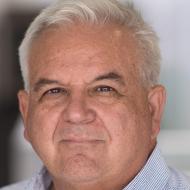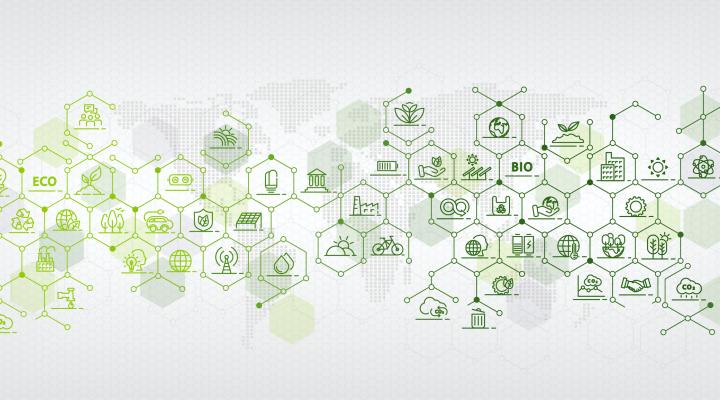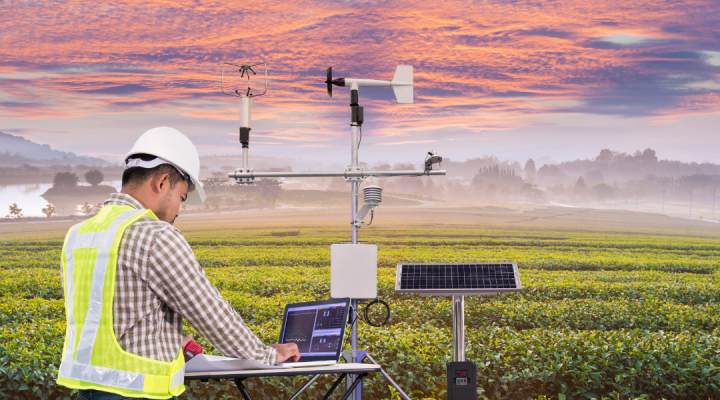By Laura A Edwards, Nigel Greenhill, and Marc J Ventresca
The challenges and early findings from the Oxford Space Initiative
Space commerce is a burgeoning frontier economy that promises not only new business horizons but also experiments for economies, societies, and emerging technologies. Yet, as the global space economy grows, the intricate dance between Space and Earth’s climate remains enigmatic – and under-studied. (Hence why some of the images in this report are AI generated via Bing Image Creator.) This situation poses important research quandaries. Earth-centric firms risk overlooking the potential of working with or alongside the space sector, and despite a surge in climate tech investments, the directives show too little imagination and focus primarily on carbon credits or capture initiatives. (Our Oxford colleague Abrar Chaudhury’s recent survey The Climate Tech Opportunity highlights these challenges.)
Our work at the Oxford Space Initiative (OxSI), based at the University of Oxford, has a primary mission: fostering space-relevant social sciences research. The aim is to rigorously examine which forms of governance of the space commons can meet the moment and which voices beyond the traditional engineering/aerospace and defence verticals can produce key insights at the space/climate nexus. As part of our inquiries, OxSI has convened a series of panel engagements and workshops at the annual UN Climate Change Conferences of the Parties (COP26, COP27 and the upcoming COP28) and also engaged with other noteworthy forums like the Oxford Sustainable Finance Summit. We focus in this report on some early findings. There is a richness in this global dialogue that extends beyond the weeks of the COPs and animates many collateral conversations; business across industries and countries is increasingly alert and engaged with the myriad opportunities available for space commerce; and for us at Oxford, the COPs are a durable participatory architecture that enables many communities of experts across the University to coordinate and pioneer sustained efforts on these big issues.
The rich global dialogue stems from an ongoing space odyssey that touches every facet of our professional and personal lives, from climate to manufacturing to national security to ethics. The current, still early phase of the global space economy offers an opportune moment to propose and practice societal and sectoral norms needed to bring the potential of emerging space economies and technologies to fruition. Mansoor Hanif of Neom, (Saudi Arabia’s sustainable regional development giga-project) captured this beautifully at COP27: 'Fundamentally space is the only place where you can see the big pictures of who we are and what we are doing to the world.'

As testament to this, there is an active movement to declare Space as the 18th Sustainable Development Goal precisely because of this distinctive synergy. These indicators are a ‘code red’ for businesses and policymakers to evolve in policy and practice in these brisk times. This could be the basis for critical solutions in the ‘governance of the [space] commons’ approach pioneered by the late Nobel Laureate Elinor Ostrom and her research team. (Our Oxford colleagues Anette Mikes and Steve New also reflect on this in Our Ministry of the Future.)
The business world is increasingly alert to these commercial issues/opportunities. As Faculty Co-Convenor of OxSI Marc Ventresca notes, 'The space endeavour today reaches beyond the exploration of the cosmos - what many refer to as Space4Space. Rather, It is also about finding solutions to big challenges on Earth, using geospatial analytics along with other new data sources and informed by the Sustainable Development Goals (SDGs) - what many call Space4Earth.'
COP26 activities
OxSI intentionally entered the Climate/Space dialogue at COP26 in 2021 with a robust session in the UK Pavilion on how investing in space could be a powerful direct means to support climate action. We spotlighted the transformative potential of the space industry in reshaping finance via geospatial intelligence, a project our colleagues at Oxford University’s Smith School of Enterprise and the Environment prioritised. Earth observation tools, amalgamated with conventional research, promise to combat greenwashing, offering unvarnished insights across supply chains and unrestricted by access to property - the satellite's ‘eye in the sky reports’ regardless of fences, itself controversial. Dr Samira Barzin, Senior Research Fellow at Oxford in Maths, Economics, and Geography, works specifically on using layered satellite data to create maps that illuminate trends in key policy areas (migration, extent of poverty, profiles of climate change) for regions and countries of the world that have historically been ‘data dark’.

Challenges remain that are typical of many early-stage markets marked by few stable rules of the game, continued ambiguity, lack of a dominant design for enabling complementary technologies, uncertainty about customers, a legacy of many cases where government funding, and early profiles have delayed the growth of viable private markets. For example, protocols and conventions in the realm of data rare needed, innovative privacy norms, to finding the insight from enormous amounts of satellite data that is material to the customer. Josephine Milward, at Seraphim Capital, notes that 'customers want more insights, not more pixels'.
We can see from space many ‘big pictures’ in terms of how human activity is changing the environment over time and how that is affecting assets today or in the future (our colleague Ben Caldecott, from Oxford’s Smith School of Enterprise and the Environment has explored this concept of ‘stranded assets’, as has Saïd Business School Emeritus Professor Andrew Baum in the real estate sector in Another Real Estate Crisis). But this does not mean that people care enough to combine those powerful insights with thousands of assets in their portfolio when faced with modest ESG requirements, which for many are not mandatory, or where compliance is driven in spirit only and where they are even outlawed in some cases in some geographies.
Equally with many harnessing the power of a diverse set of satellites, the standards and assurances around the data and insights collected will be critical for integrating such non-financial data into business as usual in a very finance-focused world. Actors like venture capitalists (VCs), private equity firms, and philanthropists play a critical role in these first stages of commercial Space, helping the dreamers and inventors to uncover material value to their satellite data-derived insights for finance, corporates and environmental NGOS. whether in the new climate economy, such as carbon credits, or in the old fossil fuel sector. Satellite earth observation (EO) is replacing people on foot, car and in helicopters; the value proposition is an improvement of human ‘eyes on’ the asset, which is often infrequent or open to influence - EO can provide more frequency and assurance. This role of non-governmental actors is fermenting demand beyond the other main driver for satellite data - the continuing role of government, especially security and defence funding. As Nigel Greenhill, Insta Associates and a OxSI Associate, predicts, ‘we will see three things in the near future, ‘continued growth in the use of EO and geospatial technology throughout the value chain, this will lead to greater understanding of our material impact on the environment, and reducing green washing when partnered with other on-the-ground verification. However, there will be a reduction of the players in the market as traditional environmental and financial data and insight providers acquire and capture the broader market from the dozens of small niche boutiques as they struggle to scale, and the government grants disappear.
COP27 activities
At COP27 in Egypt in 2022, the Oxford Space Initiative built upon the COP26 focus on investment and finance to orchestrate a symposium titled ‘Climate and Space: Unleashing Planetary Potential.’ This panel embraced a series of case studies with industry and policy makers represented by colleagues from XPRIZE, NEOM, Global Canopy, OS Climate, and Sparkgeo. They convened to deliberate on how the collective expertise, resources, and experiences of climate, space, and other significant sectors could be harnessed to expedite climate change solutions.
The concerns regarding sustainability and space go well beyond space debris mitigation, a critical starting point. Our work suggests that being accountable for the impact of the space industries on Earth, in tandem with holding the Space for Earth mandate as a North Star is a priority. This is evidenced in the broad environmental damage widely documented at many key space launch sites. We see opportunities to expand the discussion of the circular economy and supply chains to accurately and unemotionally recognise these impacts in the work of the defence and space sectors.

These open discussions and venues to connect, in the face of traditionally siloed parties, is where the COP plays a critical role as these conferences perennially underscore and highlight plural perspectives on the climate crisis. The space/climate nexus that our work develops brings a fresh, needed vantage point. The planetary boundaries framework reveals a grim picture: six out of nine boundaries have been breached indicating Earth's precarious position in the near-term, for the longer term. The synergy of space tech and its potential to bolster climate initiatives has been a recurring theme, underscoring the imperative of cross-sectoral collaboration. As Laura Anne Edwards, a Climate/Space Strategist, and core member of the Oxford Space Initiative opined at COP27, ‘climate presents perhaps the biggest market opportunity ever known to man, and space, the most exhilarating and innovative. Their confluence can be the bedrock for a sustainable future.’
COP28 upcoming activities
OxSI will have an expanded presence at COP28 in Dubai, working with several institutional partners across the world as well as several other Oxford units and teams. At this time the overlap between climate and space agendas becomes even more stark, with the Middle East and North Africa region offering an exquisite metaphor for humanity triumphing against all odds in a hostile but beautiful environment. What have we learned from those aeons that can help humanity and nations and corporations and civil society make judicious decisions for this next era? The Gulf states have been investing heavily in both space and climate and demonstrate a unique opportunity to showcase innovative governance, as well as technologies and their complements.
Space is the ultimate innovation lab. Technologies and social systems are rapidly being prototyped for this transformative new space era, to sync our explorations and our urgent need for terrestrial solutions. Our COP28 panel on 8 December in the Green Zone and related workshops will cover a set of #Space4Earth case studies, such as satellite monitoring of weather and pollution, and how these can empower communities and habitats, as well as the potential for ‘off-worlding’ a portion of mining, manufacturing, and energy production. It will ask some of the big, very human questions about equity and our shared responsibilities for embracing this frontier with humility and vision.
Our agenda at COP28 is one of research and engagement as we seek to answer three critical questions:
- Why and how is the space/climate nexus critical for the near- and long-term future of Earth?
- Which are the critical interdependencies that require attention now?
- Where are the long-term partnerships and infrastructure to build, to enable more impactful collaborations?
Join us and hear from researchers from across our team, alumni who have founded ventures addressing these issues, and other expert partners in the Oxford Space Initiative.




